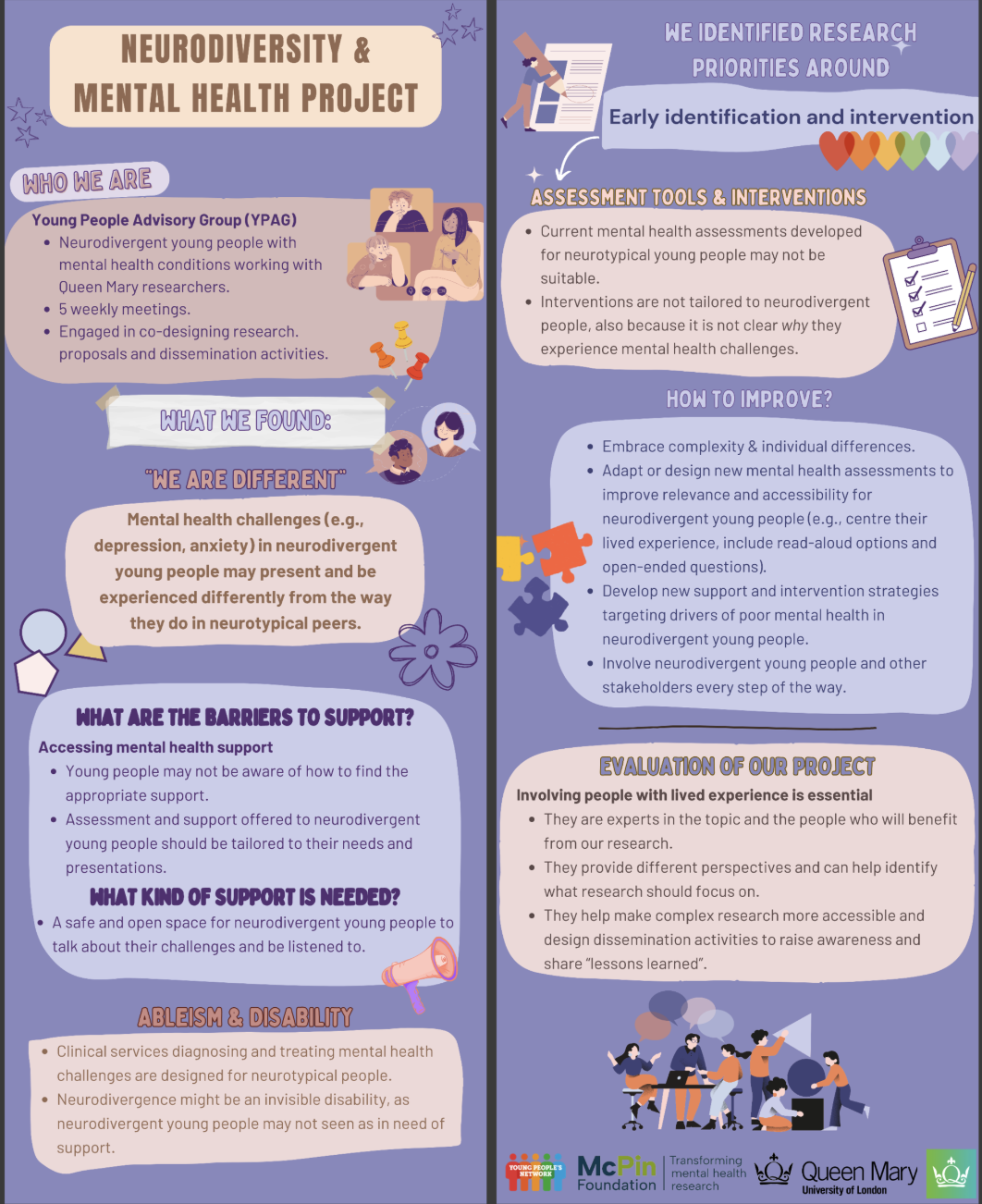Breaking down the barriers to accessing mental health care experienced by neurodivergent young people: a participatory approach
Previous research shows that most young people who are neurodivergent, with diagnoses such as autism, ADHD or dyslexia, experience significant mental health challenges, particularly depression and anxiety. However, in the real world, these issues in neurodivergent young people are often not recognised early enough, or are even missed entirely, as highlighted by the Embracing Complexity charity coalition. This lack of recognition means that neurodivergent young people are more likely to miss out on early mental health support than other young people. These issues can be even more acute for neurodivergent young people from ethnic minority backgrounds, due to cultural differences and bias.

Infographic
In spring 2023, we set out to get a better understanding of these health disparities thanks to a generous Participatory Research Grant from QMUL’s Centre for Public Engagement. Specifically, our participatory project sought to chart a clear roadmap towards earlier recognition and support of mental health challenges in neurodivergent young people. We aimed to recruit an advisory group of neurodivergent young people from diverse backgrounds to work with us throughout the project, and also gather broader perspectives from other relevant stakeholders, including parents/carers, school staff and mental health professionals.
We advertised this involvement opportunity widely with support from the McPin Foundation and QMUL Student Wellbeing services. We were positively surprised that over 80 young people applied to join our Young People Advisory Group (YPAG) in just two weeks, suggesting this is a topic neurodivergent young people are particularly passionate about. This allowed us to form a neuro-, gender- and ethnically diverse YPAG of 8 young adults with lived experience of neurodivergence and mental health challenges, who worked closely with our research team for 3 months.
We organised five sessions with YPAG members and two additional focus groups with other stakeholders. We used multiple methods to facilitate the YPAG and focus group meetings, including Mentimeter, Padlet, and both large and small group online discussions. Our discussions focused on research priorities around improving mental health in neurodivergent people, including a better understanding of the lived experiences and presentations of mental health challenges in neurodivergent young people. We also discussed how future research should address the identified priorities, and co-designed the aims of a new funding application to support this research. Finally, we worked with YPAG members to co-design dissemination activities (e.g., a seminar for QMUL researchers) and an infographic to visually convey the insights and knowledge we gathered during the project in our dissemination activities.
All YPAG members showed strong engagement throughout the project, and many of them have remained actively involved in co-producing our research at QMUL. They provided positive feedback on the variety of methods we offered them to share their thoughts and felt that they were able to do so in the way they felt most comfortable. They also appreciated being able to engage in meaningful discussions in a safe and respectful environment, learning from others, and having a clear timeline of activities. In terms of areas for improvement, some YPAG members fed back that certain technical topics should have been explained more extensively before engaging in discussions, and that they wished more time was dedicated to each task and discussion topic.
All these are helpful points that we took into account in designing subsequent participatory studies. In addition, the following issues should be kept in mind when planning and delivering participatory projects with young people:
- Safeguarding: Given the sensitive and personal nature of the discussions in this project, it is essential to establish confidentiality ground rules before the meeting. Additionally, it is important to frequently check in with participants to see if they are comfortable with the topics discussed, and circulate resources to support their mental health (e.g., Mind, Shout).
- Use of accessible language: Since people involved in participatory projects may not be familiar with academic terminology, researchers should employ clear and simple language throughout the entire project.
- Payment process: People might have different preferences on how their time is compensated, but generally receiving payments in cash or bank transfer is preferred over vouchers/gift cards. Working with an external partner, we were able to pay YPAG members through bank transfer. Additionally, it is important to make people aware of the possible implications of their paid involvement, for example relating to benefits or taxes.
Overall, this participatory project had a profound impact on our research at QMUL. It shifted our research towards meaningful topics for the neurodivergent community and inspired several new research projects that we are co-producing with neurodivergent young people. We encourage all researchers interested in similar topics to involve young people from the outset in order to embed their important input throughout the research cycle.
Written by a neurodiverse team of QMUL researchers and experts by experience: Dr Giorgia Michelini (Lecturer in Psychology), Shiqi Lu (PhD student), and members of the Young People Advisory Group (YPAG) for this participatory project.